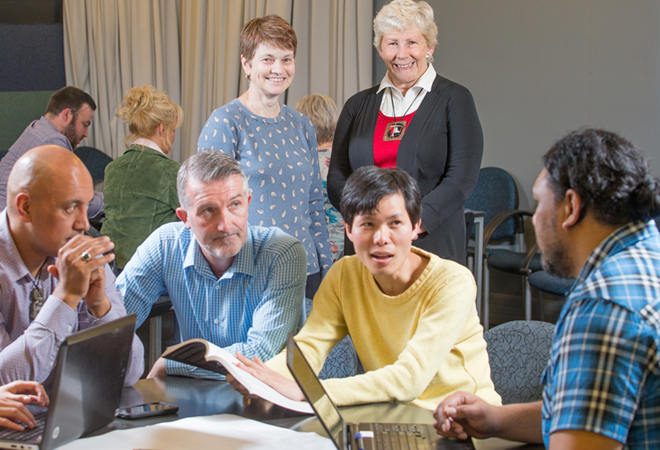
Cooperative learning lecturer training programme
Status
Completed: 12 March 2011
Project Details
A project, completed in 2011, to develop a training programme in co-operative learning (CL) for New Zealand tertiary lecturers. A collaboration of Wellington Institute of Technology and Whitireia New Zealand.
Aims:
The aims of the project were to:
- enhance the effectiveness of tertiary teaching and learning practices by providing lecturers with training in the use of CL techniques with diverse student groups
- prepare students for group work, the development of group processes, the importance of monitoring and supporting groups, the options available for fair assessment, and the development of specific guidelines for working with groups from diverse cultural, social and educational backgrounds
- provide effective training for tertiary lecturers and to improve the experiences of students required to work in diverse groups in their first year of tertiary study in New Zealand.
Methodology:
The following methodology was used to develop the programme:
- a literature review
- data from the authors’ prior research papers on lecturer training needs in tertiary institutes in New Zealand was used to formulate aspects of the training programme
- the Academic Staff Developers of the Universities of New Zealand (ASDUNZ) network, personal networks and the Adult Community Education (ACE) report on professional development programmes in tertiary institutions in New Zealand (2006) were used to identify existing programmes in New Zealand for training lecturers to use CL techniques with diverse student groups
- overseas practitioners who are conducting research to develop similar training programmes were consulted.
Team

Trish Baker
Project Leader
Wellington Institute of Technology (WELTEC)
Jill Clark
Whitireia New ZealandStatus
Funding
$9,975.00 (excl GST)
Key Findings
Key findings from the project were:
- The outcomes from this project will provide a basis for the development of tertiary lecturer training in CL in New Zealand. Participants in the pilots completed a feedback survey immediately after the programme. Several reported that they had immediately used the techniques to enhance their teaching. All participants were positive about the immediate value of the course
- Six months after the second pilot programme participants from both pilots were invited to comment on how useful the course had proved to be in practice and to suggest any modifications to the course. Fifteen participants responded; all were very positive about the value of the course and all had incorporated aspects of CL into their teaching programmes or professional development programmes. Four respondents suggested that the course become a compulsory part of professional development training in the institute. One lecturer who had had extensive experience of group work prior to attending the programme felt he also had gained the opportunity to reflect on his CL practice and make changes to the way he worked with groups.
- Benefits for tertiary lecturers: increased knowledge and understanding of the principles and practice of CL; confidence in using CL techniques; awareness of a wider range of teaching methods; experience in participating in CL activities which then is transferred to the classroom; more effective documentation for group work; improved ability to prepare, monitor and manage groups; awareness of the usefulness of CL in content-heavy courses; improved ability to design and assess group tasks; and increased knowledge of the pedagogical and cultural backgrounds of students.
- Benefits for students: more interactive classes; more engagement with learning; more engagement with other students; practical development of small group skills; more positive experiences and outcomes from group work; opportunity to develop interpersonal and intercultural skills; fair, equitable assessment of group work; and preparation for the workplace.
Key Recommendations
Key recommendations from the project were:
Benefits for cooperative learning | Studies show that, when correctly implemented, co-operative learning improves information acquisition and retention, higher level thinking skills, interpersonal and communication skills, and the ability to operate in a multi-cultural work environment.
Teaching and learning technique | Co-operative learning is a teaching and learning technique in which groups of students work on structured tasks under conditions that meet five criteria: positive interdependence, individual accountability, promotive interaction, appropriate use of small group skills and regular monitoring.
Modular approach to training staff | The project concluded that a modular approach to training staff in CL techniques and issues is the most successful option. A whole day introduction to CL, followed by optional “stand alone” modules focusing on assessment of cooperative groups and management of diverse groups, allows for flexibility for both participants and trainers. The proposed structure has the potential to be adapted and developed to meet the needs of particular institutions or disciplines.
A research report prepared by Trish Baker and Jill Clark.
(PDF, 741 KB, 33-pages).
- 28 March 2011
Report appendices prepared by Trish Baker and Jill Clark.
(PDF, 1.96 MB, 122-pages).
- 28 March 2011